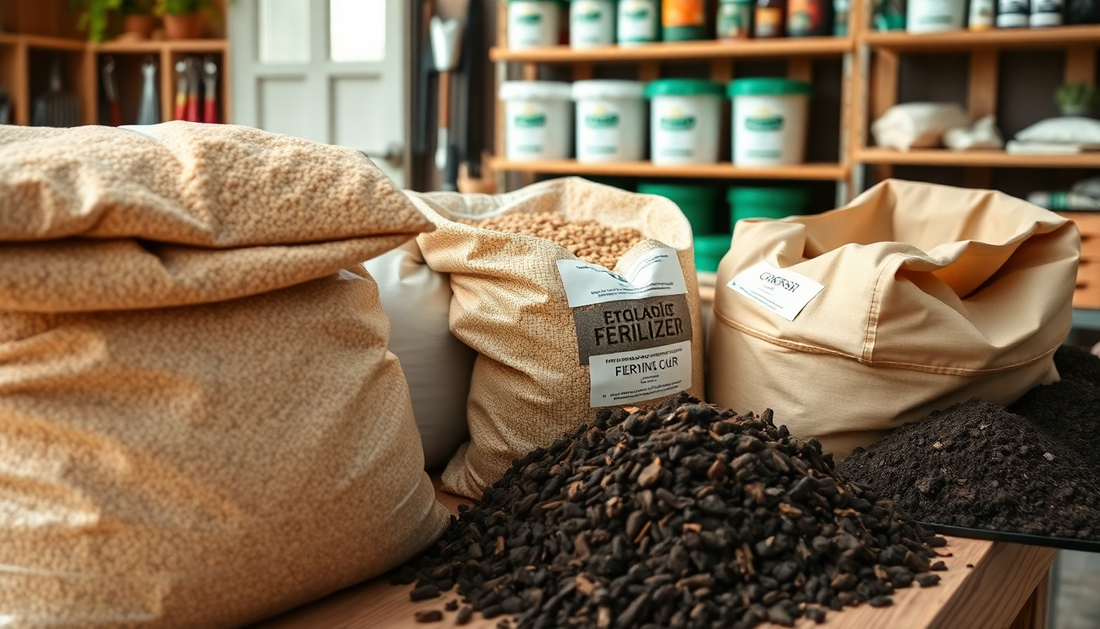
What to Do If Your Fertilizer Smells Off – Compost and DAP Storage Tips
As a passionate gardener, you take great pride in nurturing your plants and maintaining a lush, vibrant garden. However, sometimes unexpected challenges can arise, like when your fertilizer starts to emit an unpleasant odor. This can be a concerning issue, as it may indicate a problem with the quality or storage of your gardening products.
At Idyl, our mission is to provide our customers with the best possible gardening solutions, including guidance on how to address these types of situations. In this comprehensive blog post, we'll explore what to do if your fertilizer smells off, as well as offer tips on properly storing compost and DAP (diammonium phosphate) to ensure their longevity and effectiveness.
Understanding Fertilizer Odors
Fertilizers, whether organic or synthetic, can sometimes develop unpleasant smells for various reasons. It's important to understand the potential causes of these odors, as they can provide valuable insights into the condition of your gardening products.
Organic Fertilizers
Organic fertilizers, such as compost, manure, or bone meal, may emit a strong, earthy or even slightly rotten odor. This is often a natural byproduct of the decomposition process that occurs as the organic matter breaks down. While the smell may be unpleasant, it doesn't necessarily mean the fertilizer has gone bad.
Synthetic Fertilizers
Synthetic fertilizers, like DAP or ammonium sulfate, can sometimes develop a pungent, ammonia-like smell. This is typically due to the release of volatile compounds as the fertilizer reacts with moisture in the air. Again, this odor doesn't necessarily indicate that the fertilizer has spoiled, but it's important to address it properly.
Troubleshooting Fertilizer Odors
If you encounter an unpleasant smell coming from your fertilizer, follow these steps to identify the cause and take appropriate action:
1. Inspect the Packaging
Check the packaging of your fertilizer for any signs of damage, leaks, or exposure to moisture. Damaged or compromised packaging can allow air and moisture to enter, leading to the development of odors.
2. Assess the Fertilizer's Condition
Carefully examine the fertilizer itself. Look for any signs of clumping, discoloration, or visible mold or fungal growth. These can all contribute to the development of unpleasant smells.
3. Consider Storage Conditions
Evaluate the storage conditions of your fertilizer. Improper storage, such as exposure to high temperatures, humidity, or direct sunlight, can accelerate the breakdown of the fertilizer and lead to odor issues.
4. Perform a Smell Test
Carefully open the fertilizer container and take a whiff. Identify the specific nature of the odor, whether it's earthy, ammonia-like, or something else. This information can help you determine the underlying cause and guide your next steps.
Addressing Compost Odors
If the unpleasant smell is coming from your compost pile, there are a few steps you can take to address the issue:
Ensure Proper Aeration
Inadequate aeration can lead to anaerobic conditions, where microorganisms break down the organic matter in a way that produces foul-smelling gases. Regularly turning or mixing your compost pile can help improve aeration and reduce odors.
Adjust Moisture Levels
Compost that is too wet can also contribute to odor problems. Ensure that your compost pile has the right moisture content, which should be damp but not sopping wet. If necessary, add more dry, carbon-rich materials like shredded leaves or straw to absorb excess moisture.
Monitor Temperature
Maintaining the right temperature range (between 130°F and 160°F) is crucial for efficient composting and odor control. If the temperature drops too low, the decomposition process can slow down, leading to odor issues.
Consider Covering the Pile
Covering your compost pile with a tarp or other breathable material can help contain odors and prevent them from spreading throughout your garden.
Storing DAP Fertilizer Properly
Diammonium phosphate (DAP) is a popular synthetic fertilizer, but it can also develop unpleasant odors if not stored correctly. Here are some tips to ensure the longevity and quality of your DAP:
Keep it Dry
DAP is highly hygroscopic, meaning it readily absorbs moisture from the air. Store your DAP in a cool, dry place, away from direct sunlight and sources of humidity. Consider using airtight containers or bags to protect the fertilizer from moisture.
Avoid Temperature Fluctuations
Sudden changes in temperature can cause the DAP to release ammonia, leading to a strong, pungent odor. Maintain a consistent storage temperature, ideally between 50°F and 80°F.
Monitor for Clumping
If your DAP starts to form clumps or become caked, it's a sign that it's been exposed to moisture. Gently break up any clumps and consider transferring the fertilizer to a new, dry container.
Use it Promptly
DAP has a relatively short shelf life, typically around 6-12 months. Try to use your DAP within this timeframe to ensure optimal quality and effectiveness.
By following these storage guidelines, you can help prevent the development of unpleasant odors and maintain the integrity of your DAP fertilizer.
Conclusion
Dealing with fertilizer odors can be a frustrating experience, but with the right knowledge and proactive measures, you can effectively address the issue and keep your garden thriving. Remember to regularly inspect your gardening products, monitor storage conditions, and take appropriate steps to maintain the quality of your compost and synthetic fertilizers.
At Idyl, we're committed to providing our customers with the best possible gardening solutions, including guidance on troubleshooting and preventing fertilizer odors. If you have any further questions or need additional support, don't hesitate to reach out to our team of gardening experts. Together, we'll ensure your gardening journey is a success, from planting to harvesting.
Happy gardening!







No comments